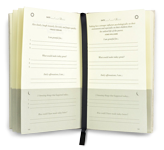
|
Day 7 Start Writing in a Journal Everyday |
Some of the world's most influential men—from Benjamin Franklin and General George Patton to George Lucas and John D. Rockefeller—made a point of writing down their thoughts each day. And many of today's most successful people do the same. Because, both then and now, these journals or pocket notebooks serve two distinct purposes: In the short term, it's a cathartic release of your thoughts and in the long term, it stands as an honest record of your life. Your ideas, achievements, hopes and fears captured for posterity. A journal is an intimate, safe environment in which to better become to person you want to be. The process of organizing a messy tangle of thoughts into coherent sentences will help you better clarify what you truly care about. The intention of sitting down to write every day will compel your mind to recognize progress. Don't worry about how much to write—there will be days that your thoughts will pour out. And other days, you'll only have a little to say. The key is to write every day. And here's why.
It Boosts Your Mental Health
According to studies by the University of Rochester, journaling is an ideal outlet to manage anxiety and reduce stress, while helping you prioritize problems, fears and concerns. The process of writing, researchers found, helps you establish order when your world feels like it's in chaos. Oftentimes, it's hard to disconnect from our daily life—be it work, relationships or other responsibilities. But taking a few minutes to settle into your own thoughts and focus on what you're thinking and feeling and planning in the moment is an ideal way to break from all those things pulling at you.

"Keep a notebook. Travel with it, eat with it, sleep with it. Slap into it every stray thought that flutters up into your brain. Cheap paper is less perishable than gray matter. And lead pencil markings endure longer than memory."
- Jack London
It Helps You Achieve Your Goals
"You are 42 percent more likely to achieve your goals just by writing them down," says life coach and author of Living Forward, Michael Hyatt, citing a Dominican University study. "It forces you to clarify what you want, motivates you to take action and enables you to see—and celebrate—your progress." After all, success can be quickly forgotten. But written goals are like mile-markers on a highway. They enable you to see how far you have come and prove that we've solved problems in the past. Not only does this make for great motivation, but it's also a serious justification for a raise or promotion at work when it comes time to talk to the boss.
It Improves Your Learning Capabilities
Think back to your days of taking notes for school. It can be difficult to retain information we hear or see. But we tend to remember things much more clearly when we write them down. Even if you never go back to re-read your notes (or in this case, your journal). And regular writing has been proven to help you learn to process and communicate complex ideas effectively.
It Increases Your Gratitude
Want to change your outlook and feel exponentially better about your trajectory in life? Make a conscious effort to include some gratefulness into your daily writing. You'll find that you begin to notice the little things for which you can be thankful for and see an improvement in your overall mood and outlook.





